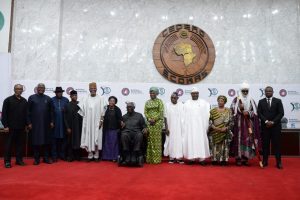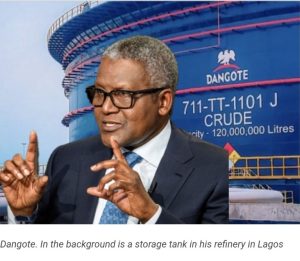Fault Lines in the Temple of Justice: What the Nestoil–Neconde Order Reveals About Limits Of Judicial Discretion


….. Controversial Ex Parte Order Rekindles Questions Around Courtroom Impunity
……And How a Fake $5m Bribery Allegation Tried But Failed to Tarnish a Chief Judge
The gavel can be an instrument of justice or a hammer of ruin. In Nigeria’s turbulent judicial arena, few recent episodes have ignited more scrutiny than the ex parte order issued by Justice Isaac Deinde Dipeolu of the Federal High Court in Lagos in the matter involving Nestoil, Neconde, and a complicated web of loan collateral.
What began as a routine commercial dispute has evolved into a national conversation on judicial discretion, institutional integrity, and the simmering anxiety around the impartiality of the country’s courts.
Through the murk of legal filings, corporate rebuttals, and public reactions, one detail remains in sharp relief: an order so sweeping in effect and so startling in its reach that it has reopened long-standing questions about the judge who issued it; questions that reverberate far beyond the courtroom where they first emerged.
Justice Dipeolu is not a new or obscure figure on the judicial landscape. For years, his name has surfaced in conversations about controversial rulings and contested interpretations of the law. His critics, particularly within civil society circles and among legal commentators, describe a judge whose decisions frequently invite debate at the appellate level.
Criticisms of his rulings resurfaced with renewed intensity two years ago, when he was compelled to withdraw from the forfeiture proceedings involving former Central Bank of Nigeria Governor Godwin Emefiele. Rumours of financial inducement swirled through the media, prompting his sudden exit from the case. Although never formally proven, the episode left a residue of public suspicion and made his subsequent rulings subject to heightened scrutiny.
A similar storm gathered around his order of October 25, 2025, directing Lotus Bank to take over the movable and immovable assets of Unpacked Limited, a firm linked to Feyikemi Abiodu and guaranteed by Oluwafemi Badewole. That decision, too, was pilloried by analysts who cited technical inaccuracies and procedural lapses. Each controversy created the impression of a judge who navigated the law with a troubling fluidity, whose interpretation of discretion bordered on recklessness, and whose rulings often left injured parties seeking refuge in higher courts.
The Nestoil matter would prove no different, except that its implications would run even deeper. At the heart of the dispute lies Nestoil, a major Nigerian oil and gas conglomerate, and Neconde Energy, operator of a significant joint-venture interest in OML 42. Nestoil had secured loans from a consortium of banks, placing various assets as collateral. These assets were held in trust by First Trustees, who also retained the power to appoint a receiver/manager should Nestoil default.
When that default allegedly occurred, the Nestoil lenders invoked their right and appointed Senior Advocate of Nigeria Abubakar Sulu-Gambari as receiver/manager through a deed dated August 21, 2025—a process familiar within commercial circles and grounded within the framework of secured credit.
The controversy emerged when the lenders sought to widen the collateral net by requesting that Neconde’s interest in OML 42 be pledged as additional security. But that request met a legal brick wall. Neconde’s OML 42 interest had already been pledged to a different group of lenders, whose consent would be required before any second-ranking charge could be created. Those lenders declined. Without such consent, no second-ranking charge existed, and none could lawfully be implied.
Nevertheless, when the matter came before Justice Dipeolu on an ex parte basis, the judge issued an order allowing the receiver/manager appointed for Nestoil to take over not only Nestoil’s assets but also Neconde’s office, assets, and OML 42 interest—entities over which the Nestoil lenders held no charge, and which lay squarely within the security portfolio of a different set of creditors.
Order number 5 of the ruling was the flashpoint. It authorised the takeover of Neconde’s office at Akin Adesola Street in Victoria Island, Lagos; any of its assets within the court’s jurisdiction; and its OML 42 joint-venture interest—all pending the hearing of a motion on notice.
For legal analysts, it was an earthquake masked in the language of judicial procedure. They argue that the judge’s decision effectively nullified the priority rights of Neconde’s own lenders, placing Neconde under receivership in favour of creditors who had no security interest in its assets. It was, in their view, a collapse of the most basic principle of secured transactions: that collateral follows the creditor who holds the charge, not the one who desires it.
The Question of Discretion
Nigeria’s legal framework grants judges narrow but necessary latitude to issue ex parte orders in urgent circumstances. Such orders are, by their nature, one-sided. They are designed to prevent irreparable harm or the dissipation of assets before a full hearing can be held. But the law is equally clear: ex parte orders are tools of last resort, to be used only when the subject matter faces imminent destruction.
Analysts argue that the Nestoil matter did not meet this threshold. No evidence was presented that Neconde’s OML 42 interest—or any of its assets—were in danger of being dissipated. Moreover, the dispute revolved around the technical validity of loan collateral, not an emergency requiring immediate seizure. To them, the judge’s choice to grant the sweeping order was not merely an overreach but an affront to the discipline of judicial restraint.
This is why four of Neconde’s own lenders swiftly applied to be joined in the suit, seeking to set aside what they described as a legally untenable and factually unsupported order. Their intervention underscored how deeply the ruling had unsettled the commercial system that depends on predictable enforcement of security rights.
Beyond the specifics of the case, the order rekindled broader concerns about the health of judicial accountability. Justice Dipeolu’s reputation, already buffeted by earlier controversies, now appeared entangled in allegations of judicial impunity, an accusation often levelled at judges whose rulings defy established legal norms or appear influenced by considerations outside the courtroom.
Legal analysts describe a pattern in his jurisprudence, rulings that frequently fail when tested on appeal, convictions later overturned due to procedural or substantive errors, and discretionary decisions they characterise as unpredictable, unfair, or excessive. For them, the Nestoil matter was not an outlier but part of a continuum that erodes confidence in the judiciary’s guardianship of fairness.
That confidence took another blow when a different storm erupted, this time outside the courtroom.
Amid the uproar over the controversial order, a rumour began to circulate that the Chief Judge of the Federal High Court, Justice John Tsoho, had allegedly received a $5 million bribe to direct Justice Dipeolu to step aside from the Nestoil matter. The claim, carried in some fringe commentaries, gained brief but intense traction online.
But closer scrutiny revealed the allegation to be baseless. Legal experts pointed out that Justice Tsoho’s directive was a standard administrative action triggered by a petition submitted to the National Judicial Council (NJC) by the Nestoil Group. When a petition is lodged against a judge, the conventional procedure is for the judge to recuse himself pending the NJC’s review. Indeed, analysts say Justice Dipeolu should have immediately withdrawn on learning of the petition, even without the intervention of the Chief Judge.
Thus, what was framed as a scandal became, on examination, nothing more than the judiciary’s internal protocol at work. For many observers, the bribery narrative appeared to be a retaliatory smear engineered by individuals determined to shield Justice Dipeolu from scrutiny or to divert attention from the substance of the controversy.
Nigeria’s judiciary, besieged by allegations of corruption, delayed justice, and political interference, stands at a delicate juncture. Cases like the Nestoil matter become more than isolated disputes, they become symbols of a wider institutional struggle. When ex parte orders are granted without clear urgency, when collateral hierarchies are ignored, when judges do not immediately step aside upon the filing of petitions, the legitimacy of the judiciary trembles.
Yet, the system is not without remedies. The interventions of the Neconde lenders, the involvement of the NJC, and the administrative clarity offered by the Chief Judge all demonstrate that institutional safeguards still exist. What remains in doubt is whether they are consistently applied.
As the dust settles on the immediate controversy, attention turns to the larger question of judicial culture. The independence of the judiciary is built both on constitutional guarantees and on the moral discipline of those who wield the gavel. A single order may determine the fate of companies, reshape commercial landscapes, or alter the trajectory of lives. When that authority is applied without caution, the consequences can reverberate far beyond the litigants before the court.
Justice Dipeolu’s critics insist that his decisions, repeatedly overturned or criticised, reflect a disregard for that responsibility. His defenders argue that he has merely exercised lawful discretion, even if unpopularly. But in the Nestoil matter, the facts and the law align in ways that make the controversy difficult to dismiss as a simple disagreement over legal interpretation.
For now, the case remains a mirror through which the public views the judiciary, its strengths, failings, and the shadows that linger where transparency should be.
The applications filed to set aside the ex parte order await determination. The petition before the NJC is yet to run its course. And the Nestoil lenders, Neconde lenders, and various interested stakeholders continue to press their arguments in what has become one of the most closely watched commercial disputes of the year.
What is clear is that this episode has rekindled an urgent conversation about judicial standards, the limits of discretion, and the imperative of safeguarding the integrity of the courts.








